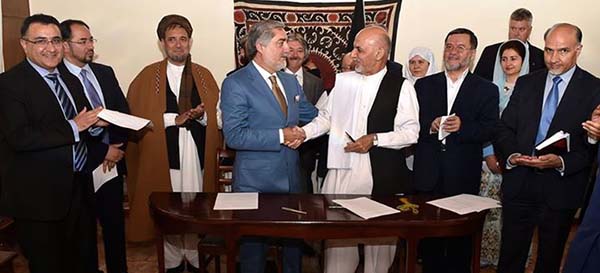Afghanistan suffered lengthened electoral deadlock, subsequent to unaddressed claims of industrial scale fraud by Dr. Abdullah earned an international concentration. Subsequent to several pauses, the ballot audit finally started under the UN, international and candidates’ observers. Seemingly, lots of efforts are exercised to mediate a deal between the two presidential runners.
The international community, including the US, had previously, urged the two candidates, extend support to the continuation of the democratic process. In that pursuit any formula other than power sharing might not seem workable, given the two candidates strongly adheres to the binding principles. However, the harmonious finalization of the disputed electoral process rests to compilation of fair and transparent results, or adopts a clear deal making course drawing equal and mutual agreement of both candidates.
Earlier, US Secretary of State John Kerry, arrived back in Kabul to help out the issues related to the presidential election, and would push the feuding presidential runners - Dr. Ashraf Ghani Ahmadzai Dr. Abdullah to implement the deal they reached last month. The July 12, deal brokered by Secretary of state John Kerry, is reinforced earlier, in a bid to diffuse the possible political tension, brokered a deal to form a national unity government. Following the meeting with Mr. Kerry, the two presidential candidates issued a joint statement, reiterating their commitment to accept the results of an internationally monitored recount brokered by Secretary of State John Kerry and to abide by a power-sharing arrangement regardless of who leads in the ballot recount.
It was Mr Kerry, substantiating change that melted away the escalating tension created soon after presidential runoff was staged. He had set several meetings with the two presidential runners, brokered a deal to ease the Afghan election crisis with a comprehensive audit of the vote was quietly agreed on an even more profound reshaping of the entire government system, with simultaneous molding presidential democracy owing an empowered president.
The power sharing accord of Mr. Kerry reads the losing candidate’s representative would serve under the president as the government’s chief executive. This stance will be amended in the a Loya Jirga, or grand council, held in two years, provided the post of the chief executive will transform into an executive prime minister. All the of important positions and ministries, in the governments will equally be shared between the two sides.
The reliable sources unraveled the deal entailed; the candidate who is declared president after a complete vote audit in the coming weeks would then appoint either the contender standing second, or that candidate’s nominee, to become a “chief executive” for the government, with power distribution as to be agreed on later. Undoubtedly, it would give rise to a blend system owing the taste of both parliamentary and presidential systems until the constitution is not amended. Following the onset of the deal, the Constitution would be amended to create a parliamentary democracy with a prime minister as head of government and a president as the head of state. It is said that both Mr. Abdullah and Mr. Ghani pledged to accept the results and form an all-encompassing unity government following the assurance of the deal with Mr. Kerry.
The credible media sources revealed that the deal was fixed between Ghani and Abdullah at this point that might turn out to be the right approach; yet it still remains an unlawful method of transfer of power, given the parliamentary system pleads constitutional amendments. It is always easier said than done, the deal making phenomenon is not easy to implement, notwithstanding there are multiple complications on the way to deal making process.
The most significant point is, the deal seemingly offers a provisional solution to the political turmoil. In the long run, the deal may not suffice the demands of each candidate, pleading for more power, from the evolving set up, that have to be parliamentary if not presidential. In case the parliamentary system is turned down, then or semi presidential system might be put into practice. The semi-presidential system is a system of government in which a popularly elected fixed term president exists alongside a prime minister, where both position enjoys a certain degree of power. One thing that moving alongside the government will be the power tussle between the then evolving positions, given each side will be striving hard to have a greater share in the setup that will be put into practice.
Bearing in mind the complications of lengthened deadlock the deal was necessitated to avert the system heading to political turmoil, nonetheless, the credibility of the electoral result still counts enormously. The deal may not be given a winning status, as long as an inclusive government is not seen successfully operating on the ground, still reliant on clearer power sharing formula. It is feared if this or identical formula fails to deliver the desired outcome, the prolonged political crisis waits the fate of Afghanistan will substantiate the potential threat to harmonious co-existence of Afghanistan.
Seeing at the gesticulation displayed by the two candidates, a varied picture is drawn from their outlook. Dr. Ashraf Ghani, till date deems himself the winner, even after the result of the recount is drawn. He is hesitant to a certain degree about the formation of the National Unity government. He still dreams of formation of unilateral government with all ministries distributed to the people of his choices. Dr. Abdullah, seemingly has installed a shift to compromise on the aforementioned setup, then aimlessly sticking to the negation of the electoral result endlessly. Previously, he uncovered his reliance to preserve national unity between the two candidates is more important than the details of their accord whilst expressing his point of view with a national unity government.
The apt functioning of National Government rest to power sharing its structure and mutual cooperation and strong coordination built between the two presidential runners, along the course of time. One can’t rule out, enormous complications the presumed setup carries along itself -till every issue is streamlined and right directed.

